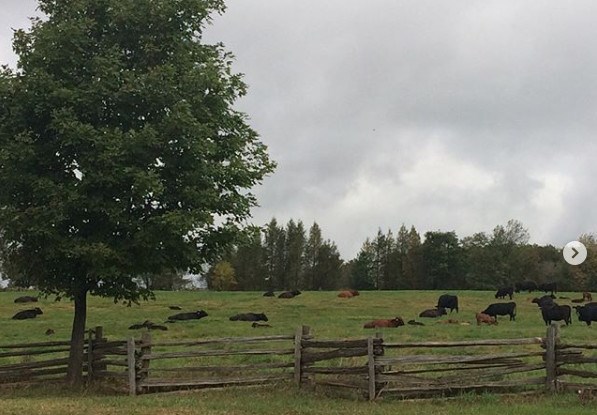A Northern Ontario beef cattle collective is gaining a reputation amongst discerning restaurateurs and butcher shops for its tasty, high-quality beef, which is spurring growth into the southern Ontario market.
Penokean Hills Farms is a group of 14 farmers scattered throughout the Algoma District producing grass-fed, Angus beef products. Over the last two years, the group has focused on the wholesale market, attracting high-end, Toronto-based clients who are enticed by the tender, earthy-flavoured meat and its Northern Ontario provenance.
“The chefs really like that kind of unique-tasting product, and being able to supply really high-quality meat every week really helps us break into that market,” said Nick Gordon, Penokean Hills’ director of sales and marketing.
More than 90 per cent of the beef is sold in the GTA, but there are also strong markets in Thunder Bay, North Bay, Timmins, Sudbury, Sault Ste. Marie and Waterloo, Gordon said.
Great-tasting meat starts with stringent genetic selection of the cattle, Gordon noted. Producers are required to use Penokean Hills’ bulls, which are highly rated for lots of marbling in the meat, making it more tender and flavourful.
For the last three to four months of their lives, the cattle are moved to a finishing farm, built last year on former airport land in the Town of Thessalon, where they’re fed a pea-and-barley mixture, which helps give the meat its signature flavour.
The diet is so well regarded the provincial government recognized Penokean Hills Farms with a Premier’s Award for Agri-food Innovation Excellence in 2008.
Every Monday, wholesale clients put in their orders for any combination of 50 cuts of meat the producers can provide, and the product is shipped directly from a Bruce Mines-based abattoir. Any leftover organs and offal are used in secondary industries, such as dog food manufacturing – Max’s Pet Food Deli in Sudbury is one client.
“We’re selling bones and offal, and selling hides, and making use of pretty much everything,” Gordon said. “So there’s very, very little waste.”
Formed in 2005 by five area farmers, the group was originally envisioned as a way to supply beef to local customers while getting a more profitable return on investment, Gordon noted.
“In the past, we were always shipping cattle down south, and you don’t get a great price down in southern Ontario for the product,” he said. “So keeping it local helps with the local economy, farmers get paid a little extra out of it, and it’s just less carbon footprint, too, if you don’t have to keep shipping cattle south like that.”
Selling the product through farmers markets and Northern Ontario retailers, the company slowly built up a roster of loyal clientele before drawing the attention of southern Ontario customers seeking meat raised naturally and without the use of antibiotics or hormones.
Business is now going so well, the group is planning the construction of a new, modernized abattoir next spring to replace the aging Bruce Mines facility the farmers currently use.
Purchased in 2015 while it was on the cusp of bankruptcy, the abattoir is the only one in the Algoma District and is used by Penokean Hills producers and area farmers to process beef, pork, lamb, bison, rabbit, chicken, turkey and more.
The acquisition has more than paid off.
“About two years ago, we were doing one animal a week,” Gordon noted. “Now we’re doing 10 to 12 a week and that’s in two years. So it’s pretty good growth and it’s working. People really like (the product).”
Gordon estimates the abattoir – currently in the design phase and valued at $1.5 million to $2 million – could be processing 40 head of cattle per week within the next few years, and the collective eventually plans to add a line of pork to its available products. The abattoir will also be equipped with a smokehouse so they can offer value-added products like bacon, sausage and cured meats.
If Penokean Hills Farms is successful in its pending bid for government funding, Gordon said the aim is to get the abattoir completed and operational by the fall of 2019.
All this growth is maintaining and creating work in Algoma's burgeoning agriculture industry. In addition to the farmers raising beef cattle and growing the crops to feed them, eight people are currently employed at the abattoir, with a few more working at the finishing farm, and hundreds more in ancillary services in the hospitality sector.
Encouraged by the flourishing interest in their product, Gordon said Penokean Hills Farms believes this growth is just the start.
“It’s taken us a long time to get there, and there’s still a lot to do, but we’re optimistic that it’s going to be more successful in the future,” Gordon said. “We’re excited to see that agricultural industry grow.”
Northern Ontario Business
